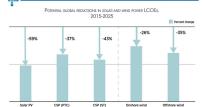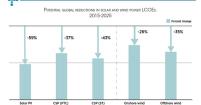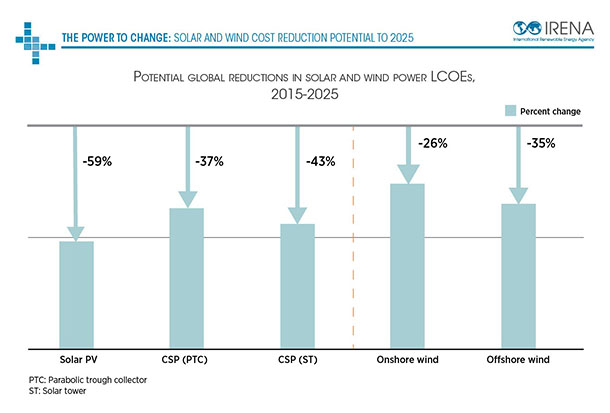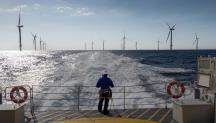

Average Costs for Solar and Wind Electricity Could Fall 59% by 2025
Newsletter
Abu Dhabi, United Arab Emirates, 15 June 2016 – The average costs for electricity generated by solar and wind technologies could decrease by between 26 and 59 per cent by 2025, according to a report released today by the International Renewable Energy Agency (IRENA). The report, The Power to Change: Solar and Wind Cost Reduction Potential to 2025, finds that with the right regulatory and policy frameworks in place, solar and wind technologies can continue to realise cost reductions to 2025 and beyond.
It estimates that by 2025, average electricity costs could decrease 59 per cent for solar photovoltaics (PV), 35 per cent for offshore wind, and 26 per cent for onshore wind compared to 2015. Electricity prices for concentrated solar power could also decrease as much as 43 per cent, depending on the technology used. By 2025, the global average cost of electricity from solar PV and onshore wind will be roughly 5 to 6 US cents per kilowatt hour.
“We have already seen dramatic cost decreases in solar and wind in recent years and this report shows that prices will continue to drop, thanks to different technology and market drivers,” said IRENA Director-General Adnan Z. Amin. “Given that solar and wind are already the cheapest source of new generation capacity in many markets around the world, this further cost reduction will broaden that trend and strengthen the compelling business case to switch from fossil fuels to renewables.”
Since 2009, prices for solar PV modules and wind turbines have fallen roughly 80 per cent and 30 to 40 per cent respectively. With every doubling of cumulative installed capacity, solar PV module prices drop 20 per cent and the cost of electricity from wind farms drops 12 per cent, due to economies of scale and technology improvements. Importantly for policy makers, cost reductions to 2025 will depend increasingly on balance of system costs (e.g. inverters, racking and mounting systems, civil works, etc.), technology innovations, operations and maintenance costs and quality project management. The focus in many countries must therefore shift to adopting policies that can reduce costs in these areas.
“Historically, cost has been cited as one of the primary barriers to switching from fossil-based energy sources to renewable energy sources, but the narrative has now changed,” said Mr. Amin. “To continue driving the energy transition, we must now shift policy focus to support areas that will result in even greater cost declines and thus maximise the tremendous economic opportunity at hand.”
The Power to Change, is the first of several solar-focused publications IRENA will release this summer. Future reports include Letting in the Light: How Solar Photovoltaics Will Revolutionize the Electricity System – which provides a comprehensive overview of solar PV across the globe and its prospects for the future – and a report on end-of-life management for solar PV panels. Both reports will launch at InterSolar Europe, taking place in Munich, 21-24 June.
Download The Power to Change: Here





